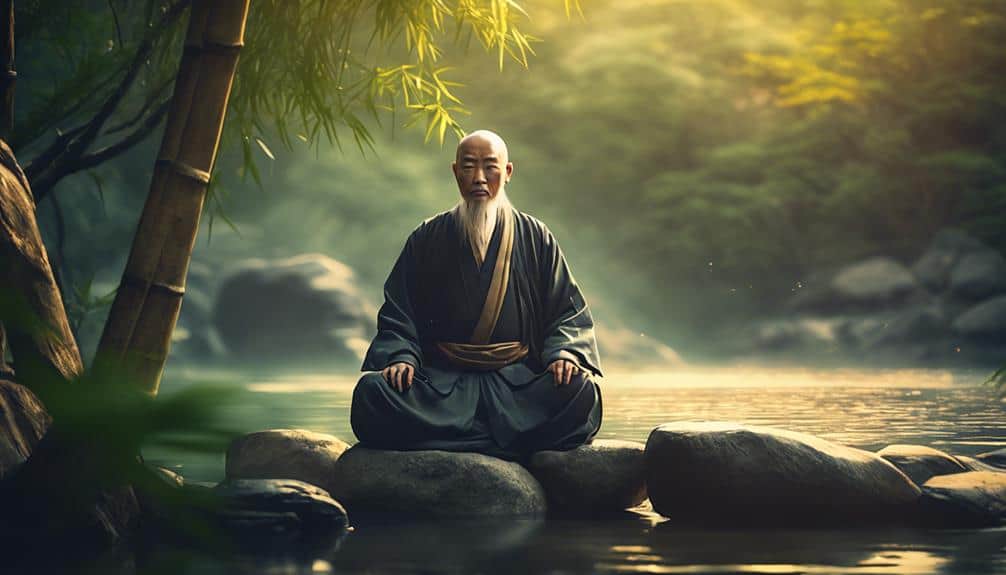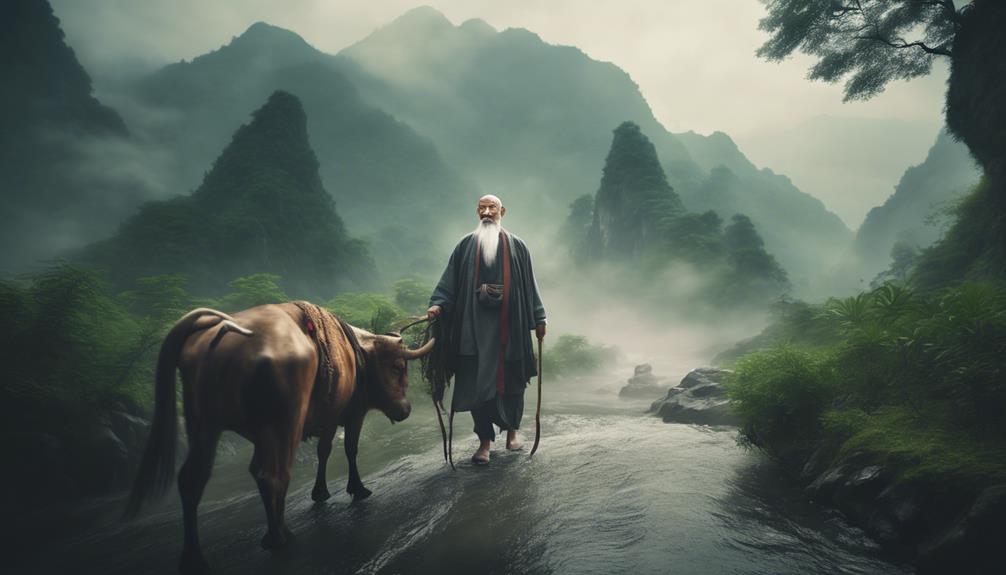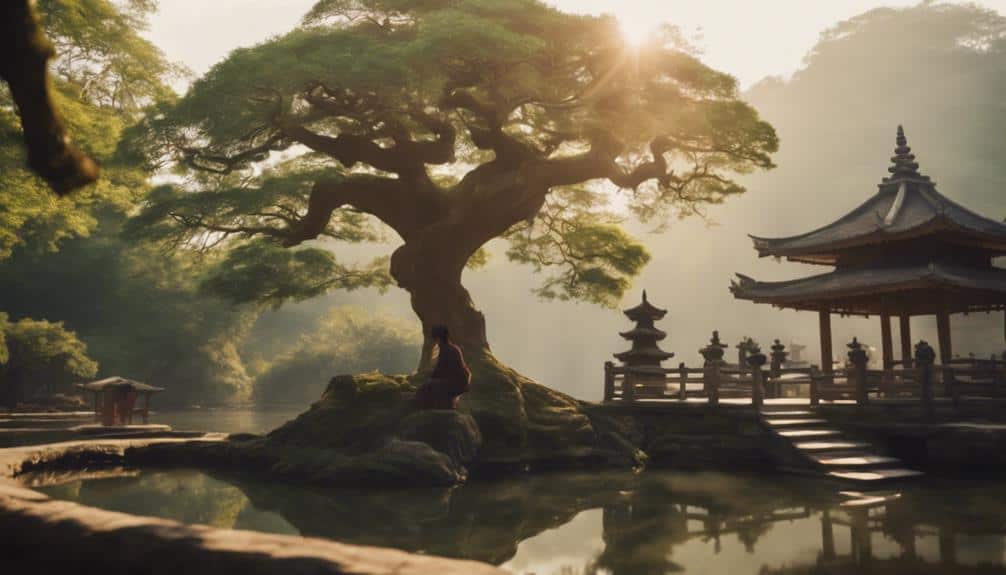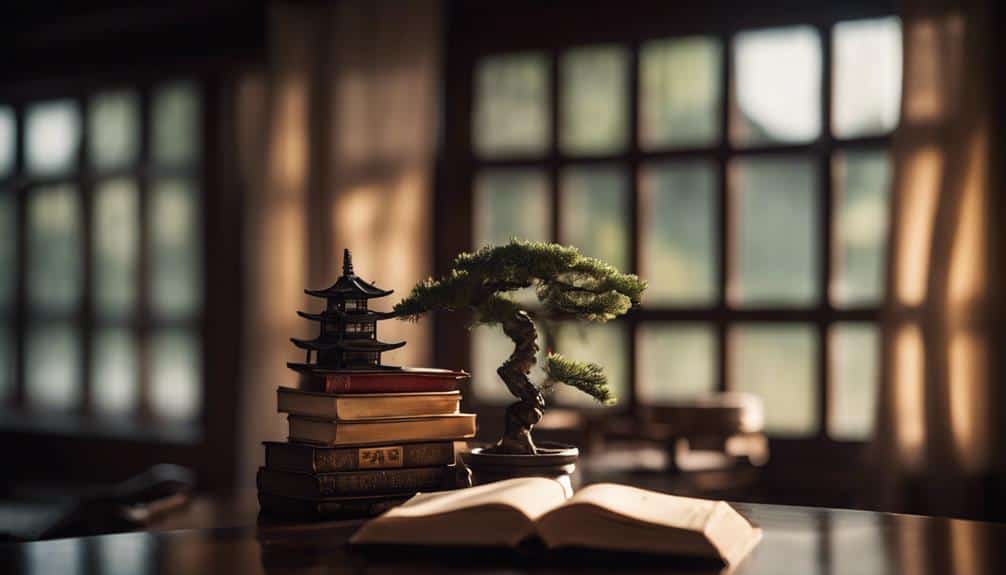Discover the timeless wisdom of Laozi and Daoism by embracing life's natural flow and practicing effortless action.
Unveil profound simplicity and harmony with the universe, guiding you toward inner peace and innovative leadership.
The Life of Laozi
Laozi, often enveloped in the mystique of ancient legends, is revered as the 'Old Master' who imparted timeless wisdom through the Daodejing. Imagine yourself in ancient China, where Laozi's presence loomed large yet remained cloaked in mystery. His life, a tapestry woven with myth and history, presents him as an older contemporary of Confucius. Laozi's title, meaning 'Old Master,' hints at a profound depth of knowledge and a life dedicated to the Daoist philosophy.
As you reflect on Laozi's teachings, you can almost hear the whispers of simplicity, humility, and natural harmony that characterize his wisdom. The fabric of his existence is intertwined with the principles of Daoism, urging you to align with the natural order of the universe. Laozi's essence isn't just in the words he penned but in the serene, unassuming life he led, embodying the very principles he taught.
The enigmatic aura surrounding Laozi invites you to ponder the balance between myth and reality, encouraging a deeper appreciation of the ancient Chinese wisdom that continues to resonate. His life, though shrouded in legend, offers a timeless guide to living in harmony with the world around you.
Core Tenets of Daoism

In Daoism, the core tenets invite you to attune yourself to the Dao, the ultimate reality that underlies all existence. At the heart of Daoism is the belief in the natural order, a harmonious balance that permeates the universe. By aligning with this inherent flow, you become one with the cyclical rhythms of life, embracing change and continuity as two sides of the same coin.
One of the key principles you'll encounter is Wu Wei, often translated as 'non-action' or 'effortless action.' This isn't about inaction or passivity but rather moving in perfect harmony with the Dao. When you practice Wu Wei, you act in accordance with the natural order, allowing things to unfold without force or struggle. It's a gentle reminder that sometimes, the most profound actions are those taken with the least effort.
Simplicity and interconnectedness also guide Daoist thought. By stripping away the unnecessary and seeing the world as an interconnected whole, you cultivate a deeper sense of unity and peace. In Daoism, you're encouraged to see beyond the surface, recognizing the intricate web of life that binds everything together.
The Concept of Dao

How does one grasp the elusive nature of the Dao, the profound principle that shapes the cosmos and guides its rhythms? The Dao, in Daoist thought, represents the ultimate reality and the natural order of the universe. It's dynamic, indescribable, and permeates every aspect of life. You can't see it, yet it's everywhere, guiding the natural flow of existence.
To understand the Dao, you need to recognize the interconnectedness of all things. The universe isn't a collection of isolated entities but a harmonious whole, each part influencing and balancing the others. This interconnectedness reveals the cyclic nature of the Dao—everything moves in cycles, from the changing seasons to the ebb and flow of human emotions.
Central to Daoist philosophy is the concept of 'enough.' Embracing contentment and balance, you learn to align with the natural flow of life. By recognizing when you have enough, you avoid the pitfalls of excess and find harmony within yourself and the world around you.
In Daoism, the Dao isn't something to conquer or control. It's about flowing with it, understanding its rhythms, and finding your place within the natural order of reality.
Understanding Wu Wei

In embracing Wu Wei, you align yourself with the natural flow of life, allowing actions to spring forth effortlessly.
Imagine moving like water, effortlessly finding your path around obstacles.
Effortless Action
Imagine moving through life with the grace of a flowing river, effortlessly adapting to each twist and turn without resistance. This is the essence of effortless action, or Wu Wei, in Daoism. Wu Wei is about embracing natural spontaneity, acting without intention, and allowing events to unfold organically.
By aligning yourself with the natural flow of life, you can avoid unnecessary exertion and achieve more with less effort.
Practicing Wu Wei requires letting go of control and trusting the process. Instead of forcing outcomes, you respond to situations with an innate sense of timing and appropriateness. This non-action doesn't mean inaction; rather, it's about the right action arising from a place of inner stillness and harmony.
When you embody Wu Wei, you create a space where ideal results manifest with minimal resistance. Leaders who practice this principle lead by example, fostering a harmonious environment where trust and natural order prevail.
Natural Flow
Understanding Wu Wei means recognizing the beauty of acting in harmony with life's natural flow, where effort and ease merge seamlessly. In Daoist thought, Wu Wei translates to 'non-action' or 'effortless action,' guiding you to align with the universe's rhythms.
Imagine gliding through life's currents like a leaf carried by a river, neither resisting nor imposing your will, but moving with grace and spontaneity.
This principle isn't about passivity; it's about sensing the natural flow around you and responding intuitively. By embracing Wu Wei, you can reduce stress and make decisions more fluidly, allowing solutions to emerge organically.
Whether in personal endeavors or business, acting without force can lead to increased efficiency and better outcomes.
Think of Wu Wei as a dance with the cosmos, where each step is in tune with the music of existence. Challenges become opportunities to adapt and flow gracefully, rather than obstacles to overcome.
Simplicity and Harmony

Laozi's teachings remind us that embracing simplicity in business can lead to profound harmony and natural efficiency. By reducing complexity and adopting a minimalist approach, you enable your organization to align with the Daoist principles of balance and unity.
When simplicity and harmony are prioritized, the result is a seamless work environment where stress is minimized, and productivity flourishes.
Consider these key steps to integrate Laozi's wisdom:
- Streamline Processes: Eliminate unnecessary steps in workflows to create more efficient operations.
- Foster Clear Communication: Encourage straightforward and transparent dialogue among team members to enhance understanding and cooperation.
- Embrace Minimalism: Reduce clutter in both physical spaces and organizational structures to maintain focus and clarity.
- Practice Wu Wei: Allow actions to flow naturally without force, fostering ease and effectiveness in your business activities.
Laozi's Leadership Lessons

Imagine leading with a gentle touch, where your actions are subtle and your presence almost unseen.
Laozi teaches that true leadership is about humility and selflessness, letting things unfold naturally.
Leading With Non-Action
When you lead with non-action, you tap into the profound wisdom of letting things unfold naturally, fostering a harmonious and balanced environment. Laozi's concept of non-action, or *wu wei*, highlights the power of minimal interference in leadership. By trusting the inherent wisdom of any situation, you can create a space where harmony and balance thrive.
Here's how to integrate non-action into your leadership style:
- Prioritize harmony and balance: Instead of imposing control, allow your team to find its own rhythm. This approach fosters trust and mutual respect.
- Exercise strategic restraint: By stepping back, you give your team the freedom to innovate and adapt. This strategic restraint can lead to organic growth and resilience.
- Lead by example: Embody the principles of non-action in your behavior. When you practice *wu wei*, your team will naturally follow, fostering a culture of empowerment and self-motivation.
- Inspire sustainable success: By embracing non-action, you encourage creativity and long-term innovation, ensuring your organization's success is both sustainable and profound.
In essence, leading with non-action isn't about doing nothing; it's about doing what's necessary in the most natural and effective way. Through *wu wei*, you can inspire a harmonious and dynamic environment where true leadership flourishes.
Humility and Selflessness
Embracing humility and selflessness in leadership allows you to create a harmonious and interconnected environment, where the needs of others naturally come before personal gain. Laozi's teachings, deeply rooted in Chinese philosophy, reveal that true leadership aligns with the nature of the Dao. By recognizing your limitations and the interconnectedness of all things, you foster an atmosphere where everyone feels valued and respected.
Humility in leadership is about understanding that you're part of a larger whole. It's a recognition that your role is to serve rather than dominate. This perspective cultivates harmony with nature, as you become attuned to the ebb and flow of the Dao, leading with grace and subtlety.
Selflessness, another cornerstone of Laozi's wisdom, encourages you to prioritize the collective well-being over individual achievements. This approach not only strengthens relationships but also builds a sustainable and ethical leadership style. By embodying selflessness, you guide without imposing, allowing others to flourish and contribute to a balanced and harmonious environment.
In practicing humility and selflessness, you embody the essence of Daoist principles, creating a leadership style that's both profound and transformative. This path leads to a leadership that isn't only effective but also deeply enriching for all involved.
Daoism in Daily Life

In the hustle and bustle of everyday life, Daoism offers a serene path through its principles of simplicity, harmony, and natural living. By aligning with the rhythms of nature as described in the Inner Chapters, you can find balance and tranquility.
Here are four practical ways to integrate Daoism into your daily routine:
- Mindfulness: Take a few moments each day to focus on your breath and observe your thoughts without judgment. This practice nurtures inner peace and clarity.
- Meditation: Set aside time for meditation to center your mind and connect with the natural flow of life. This can help you maintain emotional balance and mental clarity.
- Wu Wei (Non-Action): Embrace the principle of wu wei by letting things unfold naturally without force. This approach cultivates harmony and reduces stress.
- Simplicity: Simplify your life by decluttering your environment and focusing on what truly matters. This fosters a sense of fulfillment and serenity.
Daoism in Modern Business

In modern business, embracing Laozi's wisdom can transform your approach with leadership through Wu Wei, fostering effortless action and innovation.
By valuing simplicity and interconnectedness, you align your operations with the natural flow of the business environment.
Strategic flexibility emerges naturally, allowing your organization to adapt and thrive harmoniously.
Leadership Through Wu Wei
Leading through Wu Wei, you cultivate a work environment where actions align effortlessly with natural rhythms, fostering both harmony and innovation. Inspired by Laozi and the Dao, Wu Wei is about leading with effortless action and allowing things to unfold naturally. It's not about inaction but about strategic non-interference, trusting that the right outcomes will emerge without force.
Here's how you can apply Wu Wei in your leadership:
- Trust in Natural Processes: Instead of micromanaging, trust your team to find their own solutions. This builds confidence and fosters creative problem-solving.
- Encourage Adaptability: When you embrace change and adapt effortlessly, your team learns to navigate challenges with ease, leading to innovative solutions.
- Lead by Example: By embodying the principles of Wu Wei, you inspire your team through your calm and composed demeanor, promoting a peaceful and productive work environment.
- Foster Harmony: Prioritize harmony and balance in the workplace, creating an atmosphere where collaboration and synergy naturally arise.
Operational Simplicity
Just as Wu Wei guides leadership through natural ease, operational simplicity transforms modern business by streamlining processes and focusing on what truly matters. Embracing operational simplicity allows you to align your business with the natural order, reducing complexity and honing in on essential tasks. This approach, deeply rooted in Daoism's foundational texts, emphasizes efficiency and minimizes waste.
Imagine your business flowing like a river, unobstructed and smooth. By eliminating unnecessary complications, you create an environment where productivity thrives and customer satisfaction blossoms. Daoist wisdom teaches that when you strip away the superfluous, what remains is pure and effective. In modern business, this translates to cost savings and a more agile, adaptable model.
Operational simplicity isn't just about cutting corners. It's about understanding the core of your business and allowing it to operate naturally, with minimal friction. By adhering to these principles, you guarantee your business remains sustainable and resilient.
The teachings of Laozi remind us that true efficiency comes from moving with the flow of natural order, rather than against it. Embrace operational simplicity, and watch your business harmonize with the rhythm of success.
Strategic Flexibility
Strategic flexibility empowers your business to seamlessly adapt to the ever-changing landscape, embodying the Daoist virtue of agility and flow. In a world where business environments shift rapidly, tapping into Daoist principles can provide a guiding light.
Just as water flows effortlessly around obstacles, your business can thrive by maintaining strategic adaptability.
Consider these key aspects to foster strategic adaptability:
- Agile Decision-Making: Embrace quick, informed decisions that allow you to pivot as needed, just like water contours to its path.
- Risk Mitigation: Identify and address potential challenges before they become critical issues, flowing around obstacles rather than crashing into them.
- Opportunistic Adaptation: Stay attuned to market rhythms and capitalize on emerging opportunities, reflecting the Daoist practice of aligning with natural forces.
- Dynamic Strategy: Keep your strategic plans fluid and responsive, allowing for adjustments that secure sustained growth and harmony with the market.
The Daodejing's Teachings

In the Daodejing, Laozi's profound wisdom guides you to embrace simplicity and harmony by aligning with the natural flow of the universe. His philosophy centers on the idea that true order arises from following the natural way. By doing so, you can cultivate a life of balance and contentment.
Laozi teaches that forcing things disrupts harmony, while allowing events to unfold naturally leads to a more fulfilling existence. The Daodejing emphasizes humility, non-action (wu wei), and naturalness as pathways to virtuous living. When you act without exerting and lead without dominating, you create an environment where harmony can flourish.
Laozi's insights encourage you to let go of excess and embrace simplicity, fostering a deep sense of peace and alignment with the world around you. Moreover, Laozi's teachings on leadership are profound. He advises rulers to govern with a light touch, suggesting that the best leaders are those who lead by example, nurturing the innate goodness within their people.
Further Reading on Daoism

As you explore further into Daoism, you'll uncover a wealth of texts that illuminate its profound wisdom and timeless principles. Central to this journey are the teachings of Laozi and the Daodejing, as well as the Zhuangzi. These texts guide you toward a life of simplicity, humility, and natural harmony.
To deepen your understanding, consider the following essential readings:
- Daodejing by Laozi: This foundational text offers insights into wu wei (non-action) and aligning with the natural flow of the universe. It's a compact yet profound guide to living harmoniously.
- Zhuangzi by Chuang-Tzu: Comprising parables and anecdotes, this text explores themes like spontaneity and the relativity of human concepts. It complements the Daodejing by adding layers of mystical reflection.
- The Book of Lieh-Tzu: Another classical text that explores Daoist philosophy, focusing on the power of quietude and the importance of aligning with the natural rhythms of life.
- The Inner Teachings of Taoism by Chang Po-Tuan: This work provides insights into the internal alchemical practices of Daoism, emphasizing inner cultivation and spiritual transformation.


